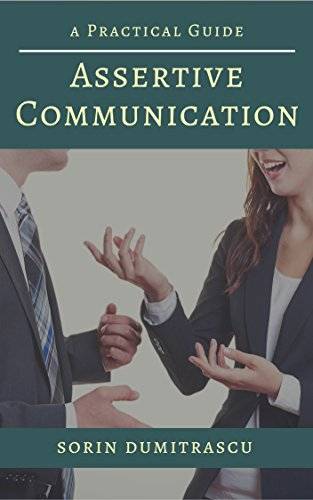

Assertive Communication: A Practical Guide
by Sorin Dumitrascu
Do you sometimes feel that your professional style is too passive, too hesitant and weak? Or do you find yourself acting aggressively toward others in the workplace, being too critical and overbearing?
Do you wonder if there is another professional business style that might be right for you? The answer may well be yes. Many people find that an assertive style meets their professional needs. Others around you appreciate this solid, constructive approach. And you can feel in control using this style to deal with co-workers or even manage or supervise employees. The assertive style can be your win-win style.
Try the role of an assertive business professional. It can be the right style for you. You can find yourself acting proactively and dealing with others responsibly. What a great feeling. The good news is that you don't have to achieve this role by yourself. This course will give you tools to help. You will learn about: becoming an assertive professional, proactive listening strategies, constructive feedback strategies.
Do you sometimes feel trapped in the way you commonly act at work? Or even angry at others who act as though you're a nonentity or someone to be avoided?
How would you like to take the lead in developing the assertive professional style you've dreamed of having, one that lets you avoid traps and anger? It's up to you to decide when you want to take charge of your life.
You've reached the right conclusion when you decide that you're the best person to take the lead in developing your professional style. You can blossom as an individual when your actions form the foundation for an assertive style that you can build on and strengthen.
Your self-confidence will increase as you use the course's methods and guidelines to change your professional style to the style you've dreamed of having.
If you have an optimistic attitude, your efforts to develop your style can be both personally and professionally rewarding. The material covered in this course will give you the tools to help yourself. The three lessons are: Developing Your Assertive Style, Self-development Strategies, and Assertive Interactions.
Do you wonder if there is another professional business style that might be right for you? The answer may well be yes. Many people find that an assertive style meets their professional needs. Others around you appreciate this solid, constructive approach. And you can feel in control using this style to deal with co-workers or even manage or supervise employees. The assertive style can be your win-win style.
Try the role of an assertive business professional. It can be the right style for you. You can find yourself acting proactively and dealing with others responsibly. What a great feeling. The good news is that you don't have to achieve this role by yourself. This course will give you tools to help. You will learn about: becoming an assertive professional, proactive listening strategies, constructive feedback strategies.
Do you sometimes feel trapped in the way you commonly act at work? Or even angry at others who act as though you're a nonentity or someone to be avoided?
How would you like to take the lead in developing the assertive professional style you've dreamed of having, one that lets you avoid traps and anger? It's up to you to decide when you want to take charge of your life.
You've reached the right conclusion when you decide that you're the best person to take the lead in developing your professional style. You can blossom as an individual when your actions form the foundation for an assertive style that you can build on and strengthen.
Your self-confidence will increase as you use the course's methods and guidelines to change your professional style to the style you've dreamed of having.
If you have an optimistic attitude, your efforts to develop your style can be both personally and professionally rewarding. The material covered in this course will give you the tools to help yourself. The three lessons are: Developing Your Assertive Style, Self-development Strategies, and Assertive Interactions.

